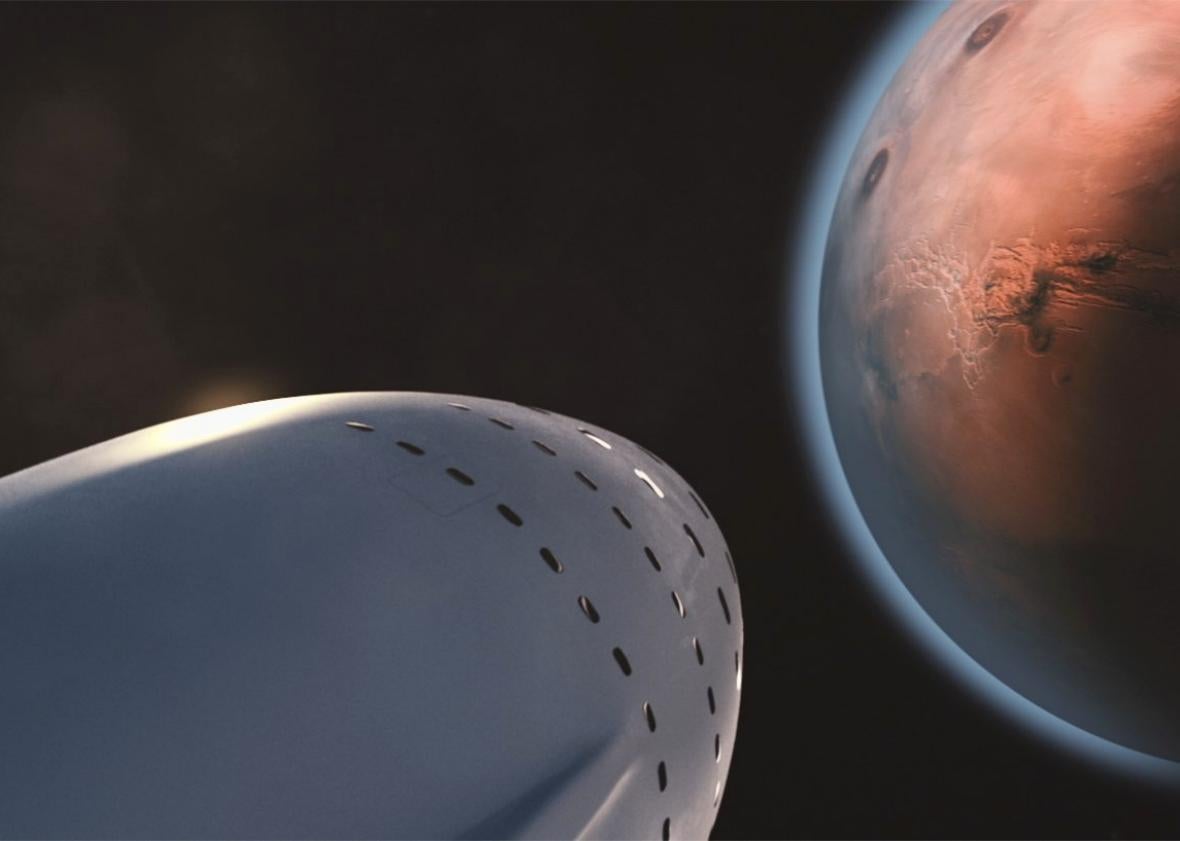Elon Musk has a plan to colonize Mars. It is weird, and risky, and very real.
In a long-awaited speech at an astronautical conference in Mexico on Tuesday, Musk detailed his ambitions to eventually create a civilization of 1 million people on the Red Planet. The roadmap—spacemap?—starts with a gigantic spaceship strapped to a gigantic rocket. Said spaceship would head to Mars at regular intervals, with 100–200 people on board for each passage. The first landings could happen within next decade, he said, if all goes well. Building a city and a civilization would take decades more.
The cost of a ticket would be quite high for the early voyages, but over time it could come down to less than $200,000, Musk predicted—comparable to the price of a house. Once all the kinks are worked out, he imagines a one-way trip would take about 30 days.
Oh, and it would be “fun and exciting,” he promises—not “boring or cramped.” There would be “zero-G games,” movies, and a restaurant. “It’ll be, like, really fun to go,” he said, chuckling. “You’re gonna have a great time.” (And if you don’t, he said, there’s a possibility you could make a return trip to Earth.)
The goal of Musk’s Mars civilization: “Making humans a multiplanetary species.” That’s crucial, he believes, because if we stick around on Earth long enough, eventually there will be “an extinction event.” He did not elaborate.
This is not a new ambition for Musk. He founded SpaceX in 2002 with the ultimate goal of trying to get people to Mars. At the time, he assumed the odds of success were quite low but he thought it was worth a shot nonetheless. Nearly 15 years later, SpaceX is a major player in the space industry, shuttling supplies, and soon human crew members, to the International Space Station.
Now Musk believes it’s time to start working on that Mars plan. As is typical of his projects, this one comes with lots of sci-fi references. The first spaceship to Mars, he said, will probably be named Heart of Gold, after the prototype starship in The Hitchhiker’s Guide to the Galaxy. The rocket will have 42 of SpaceX’s new Raptor engines.
His speech on Tuesday doubled as a pitch to NASA and private funders to bankroll the project. “I’m incredibly grateful to NASA for supporting SpaceX,” Musk said at one point. “I’m NASA’s biggest fan.”
At the talk’s conclusion, Musk took questions from the audience, which seemed to comprise exactly the sort of people you’d expect to find at a talk about colonizing Mars. One questioner spoke of his recent trip to Burning Man, compared it to Mars, and asked how Musk plans to handle the question of toilets on Mars. There was some discussion of who should be on the first voyage, given the likelihood of death; a questioner suggested Michael Cera, as part of what was apparently a pitch for the humor website Funny or Die.
Vox and the Verge, among others, have more details on the logistics and the specifications of the spacecraft involved. Suffice it to say there are rather a lot of things that have to go right before Musk’s dream can become a reality.
Musk is well aware of this. “There’s a lot of risk,” he said. “It’s going to cost a lot. And there’s a good chance we don’t succeed. But we’re going to do our best and make as much progress as possible.”
